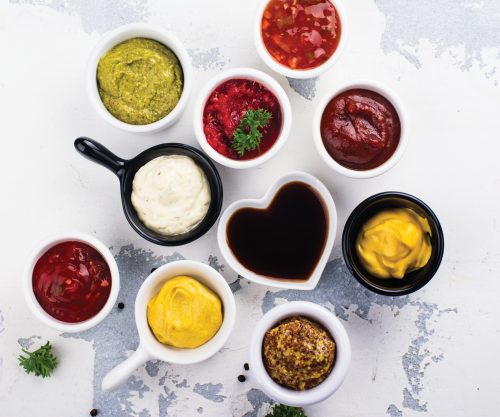Emulsifier In Food for Vegan Meal Prep
Learn Just How an Emulsifier in Food Can Assist Achieve Perfectly Combined Recipes Every Time
Emulsifiers are crucial components in the culinary globe, making it possible for the blending of oil and water-based parts. Their capability to lower surface stress enables for the production of secure blends, enhancing both structure and taste in different recipes. Understanding just how these substances function can change the way one comes close to food preparation. Lots of continue to be uninformed of the various types of emulsifiers and their details applications. Discovering this subject exposes important insights for achieving cooking perfection.
What Are Emulsifiers and How Do They Work?
Emulsifiers play an important duty in the food sector by allowing the stable mixing of components that typically do not integrate, such as oil and water. These materials have both hydrophilic (water-attracting) and hydrophobic (water-repelling) residential properties, permitting them to connect with both types of components. When an emulsifier is included to a combination, it lowers the surface tension between the oil and water, facilitating the formation of little droplets of one liquid spread within the other. This process develops a stable emulsion, avoiding separation in time and improving structure and mouthfeel. Emulsifiers are essential in different foodstuff, from salad dressings to ice creams, guaranteeing consistency and quality. They also contribute to the overall sensory experience of food, affecting taste release and visual appeal. Understanding how emulsifiers operate is essential for food researchers and cooks alike, as they endeavor to create balanced and delightful cooking experiences.
Typical Kinds of Emulsifiers Made Use Of in Food Preparation
Many kinds of emulsifiers are made use of in cooking to accomplish wanted appearances and security in different food. Usual emulsifiers include lecithin, which is normally discovered in egg yolks and soybeans, and is widely utilized in mayonnaise and dressings. Another widespread emulsifier is mustard, which includes substances that assist blend oil and water in sauces.
In addition, industrial emulsifiers such as mono- and diglycerides are commonly contributed to refined foods to enhance their security and improve life span. Starch-based emulsifiers, originated from corn or potatoes, are additionally utilized in gravies and desserts for thickening and appearance. Casein, a milk protein, offers as an emulsifying agent in milk items like cheese and cream. Each of these emulsifiers plays an essential function in ensuring that active ingredients blend flawlessly, offering the preferred uniformity and flavor in cooking productions.
The Science Behind Emulsification

The security of an emulsion counts on the balance in between the pressures acting upon the distributed droplets. If the droplets integrate, the solution can break, resulting in separation. Various variables, such as temperature level, concentration of the emulsifier, and the method of blending, affect the success of emulsification. Comprehending this scientific structure is crucial for attaining constant lead to cooking applications including solutions.
Tips for Utilizing Emulsifiers in Your Recipes
When including emulsifiers into recipes, mindful consideration of their homes and functionality can substantially boost the last product. Initially, one ought to select the ideal emulsifier based on the wanted structure and security of the recipe. Emulsifier In Food. Common alternatives include egg, mustard, and lecithin yolks, each offering one-of-a-kind benefits
It's vital to comprehend the temperature level at which the emulsifier works ideal; as an example, some emulsifiers function effectively at space temperature, while others call for heat. Slowly including oil to the emulsifier while whisking can assist develop a stable solution.
In addition, the proportion of emulsifier to liquid is important; insufficient may lead to splitting up, while too much can produce an unwanted appearance. Finally, proper storage space problems should be thought about, as some emulsified items might call for refrigeration to maintain stability and quality. By adhering to these tips, cooks can achieve constantly well-blended dishes.

Delicious Recipes Featuring Emulsifiers
While several chefs might not realize it, find here incorporating emulsifiers right into dishes can raise meals to new heights of taste and structure. A traditional vinaigrette benefits substantially from the addition of mustard, which acts as an emulsifier, providing a smooth uniformity that binds oil and vinegar effortlessly. Homemade mayo showcases the power of egg yolks, producing a creamy, elegant sauce excellent for salads and sandwiches. - Emulsifier In Food
In baking, emulsifiers like lecithin can aid achieve a tender crumb in muffins and cakes, improving moisture retention. An abundant delicious chocolate ganache, made with heavy cream and delicious chocolate, can also include an emulsifier to maintain a smooth finish. In addition, gelato usually utilize emulsifiers to assure a creamy texture and prevent ice crystal formation, leading to a delightful treat experience. By integrating these emulsifying agents, chefs can create go to this website meals that thrill the palate and supply a satisfying mouthfeel.
Often Asked Concerns
Are Emulsifiers Safe for People With Food Allergies?
Emulsifiers can be risk-free for people with food allergic reactions, depending on the certain emulsifier made use of. Cross-reactivity and specific level of sensitivities vary; consequently, seeking advice from a medical care specialist is a good idea to assure safety.
Can I Make My Own Emulsifier at Home?
Yes, individuals can produce homemade emulsifiers utilizing components like egg yolks, mustard, or honey. These all-natural choices can properly mix oils and water-based elements, using a basic remedy for numerous cooking applications.
Just How Do Emulsifiers Influence the Nutritional Worth of Food?
Emulsifiers can improve the dietary value of food by enhancing nutrient absorption and security. Excessive usage may lead to negative results, possibly altering food digestion procedures and affecting intestine health and wellness in delicate individuals.
Exist Any Unfavorable Side Effects of Consuming Emulsifiers?
Some Going Here research studies suggest that consuming emulsifiers may bring about gastrointestinal concerns or disrupt digestive tract microbiota equilibrium. However, additional study is required to totally understand their lasting effects on health and wellness and possible unfavorable negative effects.
Can Emulsifiers Modification the Taste of My Dishes?
Emulsifiers can discreetly alter the flavor profile of dishes. By boosting appearance and mouthfeel, they might make flavors a lot more obvious or balanced, however they normally do not convey solid tastes on their own.
Emulsifiers play a vital function in the food sector by making it possible for the steady blending of active ingredients that typically do not combine, such as oil and water. Various types of emulsifiers are utilized in cooking to achieve desired textures and stability in various food items. In addition, business emulsifiers such as mono- and diglycerides are usually included to refined foods to improve their stability and improve rack life. It's essential to understand the temperature level at which the emulsifier operates best; for instance, some emulsifiers work properly at area temperature, while others call for heat (Emulsifier In Food). Emulsifiers can be secure for people with food allergic reactions, depending on the details emulsifier made use of